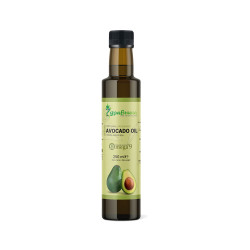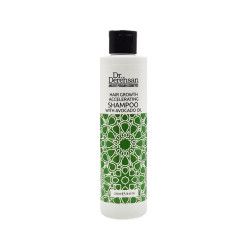Avocado is a plant from the laurel family. It originates from Central America and was known to the Aztecs and Mayans before 8000 years ago. Its name (ahuacatl) comes from the Nahuatl language, which translates to testicles because of the fruit's resemblance to this anatomical organ. The plant was brought to Europe by the Spanish in the 17th century. Today, the largest producers of avocados are Mexico, Indonesia, the USA, Brazil and Colombia. There are also large avocado plantations in Europe - in Spain and Corsica.
Avocado is a fruit rich in B vitamins, vitamin K, vitamin E, and vitamin C. Among fruits, avocado contains the most fat, and it also helps absorb fat from other foods. It is a valuable source of omega-3 and omega-6 fatty acids. It also contains copper and manganese. It contains very few carbohydrates and is a low-calorie fruit.
With its abundance of vitamins C and E, avocado is an excellent means of keeping the skin young, supple, and healthy, and the hair shiny. The presence of omega-3 fatty acids prevents the formation of wrinkles, stimulates brain activity, and relieves arthritis pain. Avocado has a high content of oleic acid - a main element in the composition of omega-9 fatty acids - which has an excellent effect on the skin and anti-inflammatory properties. It is also rich in the antioxidant lutein, proven effective in the prevention of eye problems and cardiovascular diseases.
Avocado is recommended for diabetics. It is an indispensable part of the raw food menu. It has a beneficial effect on vision and the body's immunity. It protects cells from aging and cancer, as well as slows down the development of prostate cancer. Avocados are among the best antioxidants.
Why do we love avocados?
This amazing product, as befits a real fruit, grows on trees and tastes like a vegetable! For a long time, nutritionists denounced the avocado because of its high caloric content, which they proved to be unfair - it does not contain a single gram of harmful fat.
Avocado contains substances that absorb excess cholesterol in the blood.
Thanks to its high content of folic acid, avocado is often recommended during pregnancy for a more favorable development of the future child.
Japanese scientists have concluded that this exotic fruit perfectly protects the liver from toxins.
Avocado oil easily penetrates the upper layers of the skin and promotes faster healing of wounds, which is why it is highly valued in cosmetology and pharmacology.
Avocado consumption reduces the risk of cardiovascular disease.





